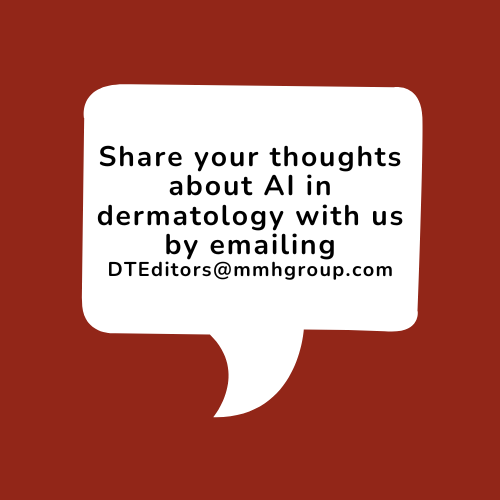
- General Dermatology
- Eczema
- Alopecia
- Aesthetics
- Vitiligo
- COVID-19
- Actinic Keratosis
- Precision Medicine and Biologics
- Rare Disease
- Wound Care
- Rosacea
- Psoriasis
- Psoriatic Arthritis
- Atopic Dermatitis
- Melasma
- NP and PA
- Skin Cancer
- Hidradenitis Suppurativa
- Drug Watch
- Pigmentary Disorders
- Acne
- Pediatric Dermatology
- Practice Management
- Prurigo Nodularis
Expert Providers Share Their Thoughts on Artificial Intelligence in Dermatology
Renata Block, PA-C; Raj Chovatiya, MD, PhD; and Zoe Diana Draelos, MD, discuss their optimism and concerns surrounding the increased use of artificial intelligence in dermatology.
Since its launch in November 2022, OpenAI’s artificial intelligence (AI) chat bot, ChatGPT, has been used by over 500 million people. GPT or “generative pre-training transformer” is a coding architecture used for language translation, question-answering, text summarization, and more.1 AI has already made significant waves across the globe as businesses, teachers, researchers, physicians, IT developers, and other career professionals have had to consider what AI can offer in their surroundings.
In both health care and dermatology, the discussion of AI is increasing as care providers are faced with questions about how AI will be used to communicate with patients or even diagnose certain conditions. To understand what concerns exist in the dermatology field and what providers are optimistic about, Dermatology Times® asked experts from our Editorial Advisory Board their thoughts on AI and what other providers can expect moving forward.

Renata Block, MMS, PA-C, is a board-certified physician assistant at Advanced Dermatology & Aesthetic Medicine in Chicago, Illinois.
Raj Chovatiya, MD, PhD, is an assistant professor of dermatology and director of the Center for Eczema and Itch at the Northwestern University Feinberg School of Medicine in Chicago, Illinois.
Zoe Diana Draelos, MD, is a consulting professor of dermatology at Duke University School of Medicine in Durham, North Carolina, the research lab lead at Dermatology Consulting Services in High Point, North Carolina, and serves as the editor in chief of Dermatology Times.
Q: How are colleagues in your network currently discussing artificial intelligence (AI) in dermatology?
Block: It is an exciting time in health care with our access to so many tools compared to 5 years ago, however, we don't have complete confidence in AI, and health care professionals should not rely so heavily on them. Some of my colleagues have "tested" AI and were shocked to see the formulated recommendations, as it would be something they would never recommend to treat the patient with. People are cautiously approaching it as it will never replace a human's diagnostic skills but may assist in making educated decisions. Most colleagues feel it is not reliable at this point and needs a lot of fine-tuning.
Chovatiya: There are more questions than answers at this point in time when it comes to the role of AI in dermatology. Feelings range from excitement over the use of AI technologies to assist with administrative tasks like charting in the electronic health record and responding to patient messages, to concerns over its use in physical examination and diagnostic testing (e.g., dermoscopy, biopsy) for clinical diagnosis. Overall, I feel that there is cautious optimism accompanied by the desire to better understand the process behind AI.
Draelos: Dermatologists are wondering if AI will change medical records. No longer will patients fill out intake questionnaires on paper. They will come to the office and sit down with a chat bot that will take their past medical history and concurrent medications. The chat bot will write a note that will then go in the medical records. Similarly, dermatologists will speak to a chat bot to compose their office note that will go directly into the medical record without any typing. This would be a huge time saver for dermatologists.
Q: What concerns do you have about the potential increased use of AI in both health care and dermatology?
Block: The biggest issue is to rely on it so heavily that health care professionals lose sight of their profession. We need to find out the quality of the medical data in these models or how the algorithm is designed to analyze it. Most of these models are designed by IT professionals that do not have a medical background. So how could anyone not practicing medicine understand the nuances of health care and the dermatology field? Medicine is a complex field, and AI is a developing technology we still need to perfect. There are also no standards in place and no known regulations that I know of.
Chovatiya: Our role as dermatologists is unique in that we process a broad amount of information when it comes to not only diagnosis but treatment decisions. This is particularly true in the case of inflammatory diseases, where we must balance that diagnosis (which itself is not always straightforward) alongside treatment efficacy, treatment safety, and patient preference. Unlike other branches of medicine, dermatology often relies less on strict diagnostics and guidelines and more on shared decision making with the patient. It remains to be seen how AI might aid or modify this practice, and I would hope that our uniquely flexible and tailored approach always remains present.
Draelos: Patients could be required to speak to a chat bot who will then diagnose their conditions and prescribe over the internet. If they do not get better, then they would have access to a human dermatologist. The chat bot is only as good as the information collected over the internet. This will impersonalize medicine.
Q: If used ethically and correctly, what pros do you see to using AI related to communicating with patients, diagnosing skin conditions, or the use of AI in clinical research/trials/journals?
Block: The key word is "correctly," which is my biggest fear of misuse and dependence on AI. The technology is not there for a dependable diagnosis, but may be used as a secondary resource of information that should be fact-checked. At this point, the pros of what we have available can be used to augment the medical practice. Specifically in gathering information about the patient, assisting in writing a prior authorization, communicating with the patient, and providing the patient with education. It should not be near clinical research/trials/journals or diagnosing skin conditions.
Chovatiya: There is no question that technology will continue to advance at a rapid pace over our lifetime. Whether we like it or not, AI is here to stay. If used correctly, AI could present a major leap forward in our ability to communicate rapidly and accurately, particularly with patients or insurers. In addition, AI can provide another voice in the case of diagnostic conundrums, much as we use image libraries, primary literature, and/or discussion with our colleagues currently. Finally, I see AI as being a helpful tool when it comes to clinical and basic research, especially when it comes to combing through large amounts to understand what has been previously studied and what data gaps exist.
Draelos: I think medical care costs might drop if all patients had to see a chat bot prior to seeing a human physician. However, I think the chat bot would make mistakes and delay proper medical care. I also think the digital world is becoming less human and it is hard to think that that chat bot is empathetic. The chat bot is not the same as speaking to a live human. Bedside manner is taught in medical school and is an important part of healing. Bedside manner would be lost in the AI world. I think human contact is an important part of healing. As for the research aspects of AI, I am concerned about the use of AI in medical writing. AI is a wonderful way to perpetuate incorrect information. AI strings together pieces of information. It cannot assess accuracy or if the information strung together is pertinent. It is also incapable of totally original thinking because if it cannot find the idea on the Internet, it cannot incorporate the idea into any of its written materials. I think medical research would suffer as AI papers are remarkably similar in composition and bland.
Q: The National Academy of Medicine has announced it will convene a group to develop an Artificial Intelligence Code of Conduct to outline the role of AI in health care and research.2 What is most important for you to see within this code of conduct?
Block: A code of conduct is necessary as we have to set the standards of who is developing the programs to ensure all the appropriate data is captured and disseminated. I firmly support the National Academy of Medicine's pursuit of standardizing the AI platform in medicine for the public's safety, as all AI platforms used in society must be reliable and accurate; we should not accept anything less. In the end, it should never substitute the prognosis of health care professionals. It should only be utilized as an adjunct, and due diligence of the health care professional using the AI platform must be a part of it.
Chovatiya: At its core, there are a few key principles we must keep at the forefront when it comes to AI in dermatology. We must have an open and honest discussion about: (1) what exactly is the nature of AI; (2) how AI is developed and will continue to be developed over time; (3) how it can be used to assist both clinical care and research; and (4) most importantly, how it may be detrimental to our fundamental role as dermatologists when it comes to patient care.
Draelos: I think the most important would be for researchers to acknowledge the percentage of their manuscript that was written by AI and identify which portions of the manuscript were generated by AI. This is also done with hired medical writers. AI would basically take the place of a medical writer. I think the profession of medical writing will change dramatically.
Q: AI has already been discussed and used in skin cancer detection. What other skin conditions do you think may be incorporated into AI detection?
Block: Having AI diagnose skin cancer, particularly melanoma, is a slippery slope. I had the privilege to be part of a government public advisory board amongst leading dermatologists nationwide, discussing the impact AI can have on melanoma skin cancer detection and the risk to the public, along with the standards of developing the AI program to make an accurate diagnosis. Though it may be beneficial years from now, we need more confidence concerning melanoma or other skin cancers diagnosed by AI before we start looking at other skin conditions diagnosed with it. That said, based on the robust discussions and the government's role in protecting the public, it has so much potential and, if developed with caution and used correctly, can significantly impact how we practice in the future.
Chovatiya: I’m most excited about the prospect of AI being used to better phenotype chronic immune-mediated inflammatory diseases. As we bring so many more new treatments to the market for psoriasis, eczema, vitiligo, hidradenitis suppurativa, alopecia areata, chronic urticaria, and beyond, it has become increasingly challenging to match the right treatment to the right patient. It is thrilling to imagine a day where AI may be able to help us immediately maximize disease control and make more informed decisions beyond what we hear in the patient history and observe on physical exam.
Draelos: AI will certainly take over much of dermatopathology. I would think that AI would read most biopsy slides and then those slides where it could not give a definitive diagnosis, a human might be called in to overread the pathology.

References
- Ahsan S. Yale experts explain ChatGPT. Yale News. Published January 27, 2023. Accessed June 28, 2023. https://yaledailynews.com/blog/2023/01/27/yale-experts-explain-chatgpt/
- NAM leadership consortium collaborates with leading health, tech, research, and bioethics organizations to develop health care AI code of conduct. National Academy of Medicine. Published June 20, 2023. Accessed June 28. 2023. https://nam.edu/nam-leadership-consortium-collaborates-with-leading-health-tech-research-and-bioethics-organizations-to-develop-health-care-ai-code-of-conduct/

2 Commerce Drive
Cranbury, NJ 08512
All rights reserved.
